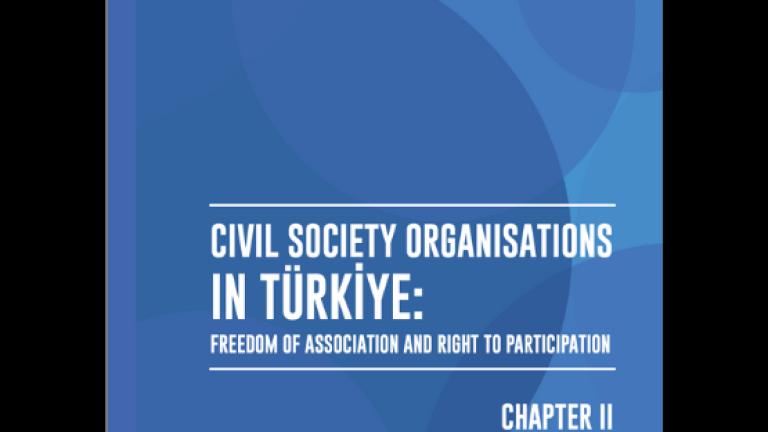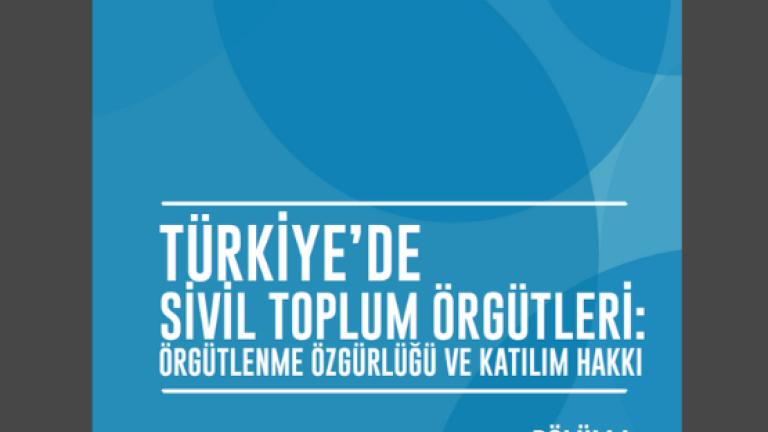
The report showed that civil society organizations are threatened in various ways, from verbal harassment to armed attacks, in addition to state pressure. The report concludes that rights-based civil society organizations remain the hope of civil society.
Legislation continues to be a challenge for CSOs
There are problems in almost every area, from incorporation to member registration. While the report recalled that the long-mentioned shrinkage in the civil sector continues, the research findings showed that one in five civil society organizations is struggling due to legal regulations.
Although it is not provided for in the law, additional documents are required from CSOs when establishing associations. 21% of the CSOs participating in the study stated that they were treated according to political criteria when registering.
The obligation to register members continues to cause problems
The survey found that the negative effects of the change to the membership registration requirement made in the Law on Associations in 2020 continue to exist. 12% of the associations that took part in the survey stated that they had experienced problems due to the obligation to register members. Following the introduction of the obligation to register, the number of association memberships fell by almost 4 million.
The figures are not encouraging: the number of CSOs in Turkey lags behind Europe
The monitoring study has shown that the most common structure of civil society organizations in Turkey continues to be associations. According to the records of the General Directorate of Civil Society Relations of the Ministry of Interior, there are 101 thousand 806 associations operating in Turkey.
While the number of civil society organizations in Germany will be 620 thousand in 2022, the number in France will increase to 1 million 500 thousand. Among European countries, the Scandinavian countries are far ahead in terms of the presence of CSOs in relation to their population. According to the data for 2022, there are 100 thousand associations in Denmark and 108 thousand 96 associations in Finland.
The study found that Ankara has the most associations and foundations per capita. While there was one association per 542 inhabitants in Ankara, the provinces with the fewest associations per capita were Şanlıurfa, Van, Mardin, Diyarbakır and Van.
Civil space tries to exist with voluntary contributions
While civil society organizations account for only about 0.3% of total employment in Turkey, 77% of the CSOs that participated in the field research conducted as part of the monitoring study were found to have no full-time paid staff.
The report noted that civil society organizations have limited resources to raise funds, that the organizations try to survive largely on the contributions of their members, and that they face difficulties in collecting grants and donations due to problems arising from legislation.
While the monitoring study found that organizations with a strong institutional structure have more employees, it said that civil society organizations in Turkey are far from professionalization and organizations try to exist with voluntary contributions.
The income of half of the associations is less than 10 thousand TL
The study has shown that the associations also lack financial resources. While the income of almost half of the organizations that participated in the survey remained below 10,000 TL, it was found that the fundraising opportunities of CSOs in Turkey are very limited and that membership fees and donations, which are the main source of income for CSOs, are insufficient.
The distribution of public funds is unfair
The report found that only a very limited number of CSOs benefit from public funds, that the number of organizations that have access to international funds is small, and that those that do have access to funds are targeted. One in four CSOs that took part in the survey stated that they consider the decisions made in the distribution of public funds to be unfair.
CSOs persevere despite everything
In the assessment section of the report, it was noted that despite fundraising problems, pressure and negativity, rights-based organizations continue to be the hope of civil society.
“Despite all these constraints, rights-based organizations, which make up about 15% of CSOs in our country, continue to be the hope of civil society in our country with their advocacy activities, the resources they create, the collaborations they build at the international level, and their efforts to influence public policy despite all the difficulties. However, these organizations are also more affected by the problems in the area of freedom of association and face greater pressure.”
Inspections against CSOs increase every year
According to the General Directorate for Civil Society Relations, the Ministry of the Interior inspected 29,987 associations in 2022. During the inspections, judicial and administrative measures were taken against more than 10% of the associations. The investigation revealed that the fact that they are the subject of smear campaigns in the media or receive support from targeted foundations is also a reason for scrutiny.
The research found that rights-based CSOs were more often threatened or targeted by politicians and officials, but the same group also frequently experienced secret inspections by public bodies. Again, organizations with a strong rights-based approach faced more pressure than other organizations due to their statements and work. The organizations participating in the research also stated that they self-censor their work.
From verbal harassment to armed attacks - CSOs are under threat
The report also gave examples of verbal and physical pressure on CSOs. Armed attacks on Cemevi and Alevi associations and foundations in the Çankaya and Mamak districts of Ankara, as well as on the Havle Women's Association, which was verbally harassed and attacked for supporting Pride Week, were mentioned in the report.
It was emphasized that verbal and physical attacks on civil society organizations also negatively affected organizations that were not subjected to verbal or physical attacks and made them feel under pressure.
The doors of the state are closed to civil society
The monitoring study has shown that the participation of CSOs in decision-making processes is still severely limited. The review of legislation conducted as part of the study found that there are 203 regulations and 309 participation mechanisms for the involvement of civil society organizations in decision-making processes. It was emphasized that despite the abundance of mechanisms, there was a lack of coordination and a wide field of initiatives was left to the administration.
While 163 laws were adopted by the Turkish Grand National Assembly between 2021 and 2022 and came into force, it was revealed that the opinions of civil society were not taken into account in the proposed laws that directly affect the areas of work of civil society organizations. For the study, 8 laws for 2021 and 10 laws for 2022 were examined in detail. Among these, it was found that relatively effective CSO participation was only achieved in 2 laws.
“So, when some things come to the commissions, yes, sometimes we can get them through the MPs in those commissions. But now there are a lot of things that become law before they even get to committee. So at a certain point, even that becomes difficult. And some things can happen in the middle of the night. That is also difficult. Or MPs may not be able to attend committees sufficiently. In other words, if there is no opposition present, especially if there are no MPs present, that is also a problem. "So when we talk about laws and legislation, that's the situation."
The participation of CSOs in decision-making processes is the initiative of the administration
The report points out that the participation of civil society organizations in decision-making processes is not clearly regulated in the legislation on participation mechanisms. It states that the administration decides whether working groups are established and, even if they are established, whether civil society organizations can participate in these groups.
In 2021 and 2022, 411 regulations were published by public institutions and organizations. 71 ordinances were selected for the research sample. Following requesting information on these regulations, it was found that a study was conducted on 19 of them to ensure the participation of CSOs in the preparation process.
Sectoral associations are accepted at state level
The study also found that sectoral CSOs that have close relationships with the private sector, sufficient financial capacity and the power to influence bureaucracy and policy have an easier time influencing the participatory processes.
The three ministries with the most participation mechanisms were the Ministry of Agriculture and Forestry, the Ministry of Commerce and the Ministry of Industry and Technology. The report has shown that the participation mechanisms of these ministries are to a considerable extent carried out by associations or higher-level organizations established by companies or professionals working in a specific field, which can be described as industry associations.
Participation in decision-making processes is declining
While the rate of CSOs participating in the meetings organized by public institutions and organizations in the monitoring study was 18%, the reasons given for non-participation in the meetings of public institutions and organizations were that the CSOs were not aware of the meetings and were not invited to the meeting.
While the report shows that the participation of civil society in policy development and decision-making processes in Turkey at local and national levels has decreased over the years, according to the data, 80% of CSOs cannot be part of participation processes.
Limited, well-intentioned initiatives get lost in a complex maze of laws and the websites of public institutions. It is impossible for the average citizen to recognize these few opportunities for participation and contribute to the process, even if they want to.
“There are things that are getting narrower and narrower. We used to be able to go to parliament. We could go to the committees where the laws are dealt with first and listen there. Now there's nothing like that anymore. “They only call speakers now.”
"We do not have anything at the level of cooperation, we do not have such concrete cooperation. (…) In the past, there was also AKP. (…) There was the CHP, there was the HDP. (…) But we are no longer in such an environment. At the moment it is very difficult to find interlocutors and listeners from the AKP."
“Almost zero. (…) So there has been a very serious change in the last ten years. At least in the last 10 years. We have difficulty getting access to anything at all, to policies or decisions. Not to mention participating in the development of a wetland management plan. We are an institution that should automatically be invited, but we are still not included.”
About the research
During the field research, a survey was conducted among 1003 civil society organizations. In-depth interviews and 2 focus group sessions were also conducted with 48 civil society organizations doing rights-based work in different cities. For the research, which was supported by desk research, the Office of the President and 12 ministries, in particular the Grand National Assembly of Turkey, were monitored. Requests for information were also sent to the governors of 30 provinces with metropolitan status.
While the first part of the report deals with freedom of association and the impact of freedom of association issues on civil society organizations, the second part focuses on the right of organizations to participate in decision-making processes.
Documents



